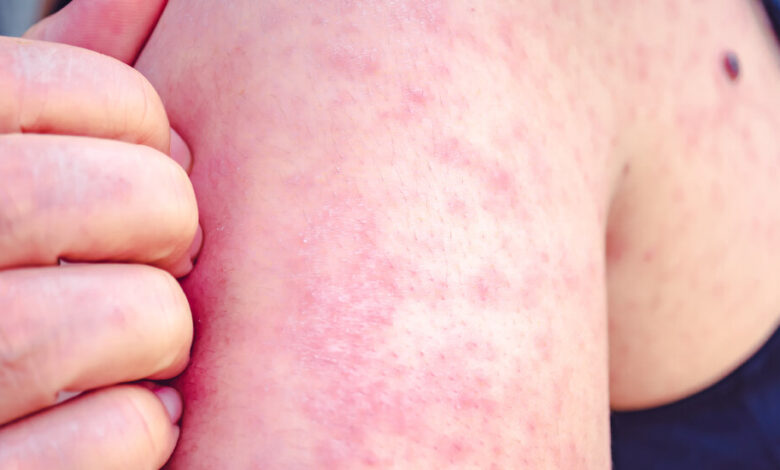Amid Florida’s Measles Outbreak, Surgeon General Goes Against Medical Guidance

As a cluster of measles cases grew in an elementary school in southern Florida, the state’s surgeon general sent a letter to parents that contradicted widespread medical guidance about how to keep the disease from spreading.
Doctors and health officials typically recommend that children who are not vaccinated for measles isolate for 21 days after they have been exposed at school. In the letter, the state surgeon general, Dr. Joseph Ladapo, said it was up to parents and guardians to determine when their children can attend school, even if those children have not been vaccinated against the disease.
“Because of the high likelihood of infection, it is normally recommended that children stay home until the end of the infectious period,” the letter read. However, the state Department of Health “is deferring to parents or guardians to make decisions about school attendance,” the letter, sent to parents at Manatee Bay Elementary School in Weston, Fla., continued.
Dr. Ladapo added that these recommendations might change in the future and stressed that children with measles symptoms should not go to school. As of Friday, there were six confirmed cases at the school, according to Broward County Public Schools.
Measles is one of the world’s most infectious diseases. Cases and deaths have been rising across the globe, in part because health officials have struggled to vaccinate people in the wake of the coronavirus pandemic and growing vaccine hesitancy. In January, the Centers for Disease Control and Prevention warned physicians to “stay alert for measles” as more cases emerged in the United States, largely among unvaccinated children and adolescents.
Dr. Ladapo, a former clinical researcher at the University of California, Los Angeles, has played a prominent role in the administration of Gov. Ron DeSantis, a Republican, appearing with the governor at events that mainstream public health experts have repeatedly criticized as spreading dangerous falsehoods.
Since Mr. DeSantis appointed him in 2021, Dr. Ladapo has aligned himself with anti-vaccination claims on Covid-19 vaccines, issuing misleading claims about their risks. At one point, the Food and Drug Administration responded to his claims by saying that such misinformation “puts people at risk of death or serious illness.”
Doctors expressed alarm over Dr. Ladapo’s statements on measles. “He said you don’t need to quarantine, just go out there and infect as many people as you like,” said Dr. Paul Offit, a vaccine expert at the Children’s Hospital of Philadelphia. A spokesman from the Florida Department of Health said that the office had no further comment and referred back to the letter.
In January, Dr. Ladapo called for a halt on Covid vaccines. “Basically, it’s freedom trumps public health, freedom trumps protection,” Dr. Offit said, calling the letter “absurd” and “unbelievable.”
Dr. Nandita Mani, an infectious diseases physician at the University of Washington Medical Center, called the letter “very concerning.” An unvaccinated person who is exposed to measles is almost certainly going to get infected, she said. “It’s just that transmissible.”
How does measles spread?
Measles tends to circulate particularly well in late winter and early spring. The virus spreads when an infected person breathes, coughs or sneezes, Dr. Mani said. It can linger in the air and on surfaces. “Someone with measles doesn’t have to cough on you, you don’t have to touch them,” said Dr. Gary Reschak, a pediatrician at Northwestern Medicine Huntley Hospital.
“If someone with measles was in the room, they left, an hour later you go in and you are susceptible — there’s a 90 percent chance you could pick that up,” he said.
The C.D.C. recommends that children start getting vaccinated for measles at 12 to 15 months old. People who are fully vaccinated against measles are roughly 97 percent protected against infection.
When measles is spreading throughout a community, though, “it’s going to find unvaccinated people pretty quickly,” said Dr. Amesh Adalja, an infectious disease physician and senior scholar at the Johns Hopkins Center for Health Security.
For most children, a measles infection will be fairly mild, he said — symptoms can include fevers, coughing, runny noses, red eyes and rashes.
The disease can be serious, though, particularly in people with compromised immune systems, pregnant women and children younger than 5. About one in five unvaccinated people in the United States who get measles ends up in the hospital, according to the C.D.C. People can develop pneumonia, which is the most common cause of death from measles among young children; their brains can also swell, leading to deafness or intellectual disabilities, the agency reported.
Health officials usually recommend a 21-day quarantine for unvaccinated schoolchildren because that’s the amount of time it can take for people to develop symptoms.
“You want to keep the schools open, but the minimum you should be saying is if you’re not vaccinated, for whatever reason, just stay home until we get this under control,” Dr. Adalja said.
Patricia Mazzei contributed reporting.
Source link



